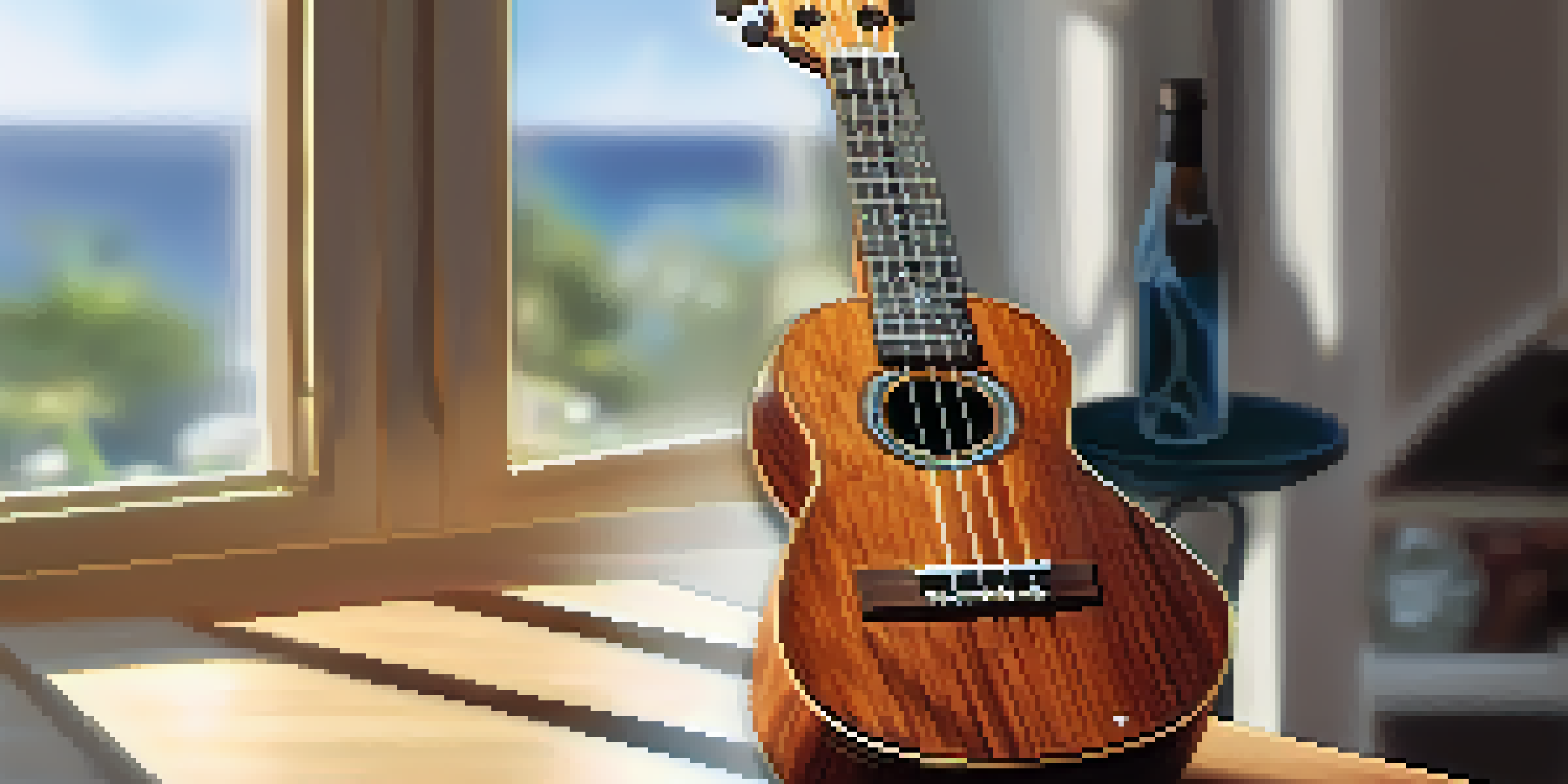Identifying Common Ukulele Issues: Maintenance Guide

Understanding Ukulele Tuning Problems
One of the most common issues ukulele players face is tuning problems. If your ukulele sounds off, it might be due to temperature changes or string wear. Regularly check the tuning, especially after long periods of not playing.
Music is the shorthand of emotion.
Strings can stretch over time, which is why they may need retuning frequently. If you notice persistent tuning issues, it might be worth replacing your strings. New strings not only sound better but can also help maintain the instrument's overall health.
Additionally, ensure that the tuners are functioning correctly. If they feel loose or slip easily, they may need tightening or replacement to keep your ukulele in tune.
Dealing with Buzzing or Muted Sounds
Buzzing or muted sounds when you strum can be frustrating, but they are often easy to diagnose. This issue is usually caused by improper string height or a poorly adjusted bridge. If the strings are too low, they might hit the fretboard, causing unwanted buzzing.

Another common cause of buzzing is dirt or debris on the fretboard or strings. Regular cleaning can prevent this issue, ensuring that your ukulele sounds its best. Simply wipe down the strings after each use and occasionally clean the fretboard with appropriate products.
Common Ukulele Tuning Issues
Regularly check and maintain your ukulele's tuning to avoid sound problems caused by string wear or temperature changes.
If cleaning and adjusting string height don't solve the problem, check for any damage on the frets. Worn or uneven frets may require professional leveling or replacement.
Identifying Intonation Issues
Intonation refers to how well your instrument plays in tune across the fretboard. If notes sound in tune in one area but not in others, your ukulele may have intonation issues. This can happen due to improper saddle placement or string action.
The beautiful thing about learning is that no one can take it away from you.
To check intonation, play a note on the 12th fret and compare it to the open string. If they don't match, adjustments may be needed. Sometimes, simply moving the saddle can correct the issue, but it might require professional help if it's more complicated.
Investing time to correct intonation can significantly enhance your playing experience. A well-set intonation ensures that every note rings true, making your music more enjoyable.
Recognizing Structural Issues
Structural issues in your ukulele can lead to bigger problems if not addressed promptly. Look for signs of cracks, especially around the body and neck joints. Cracks can affect sound quality and may worsen over time if ignored.
Another sign of structural issues is a warped neck, which can cause string action problems. If you notice your strings are uncomfortably high or low, it might be time to have a luthier assess the neck's curvature.
Identify and Fix Buzzing Sounds
Buzzing can often be resolved by adjusting string height or cleaning the fretboard to eliminate dirt and debris.
Regularly inspecting your ukulele for these issues can save you money and ensure a longer lifespan for your instrument. Preventative maintenance is always better than dealing with major repairs later.
Caring for Your Ukulele’s Finish
The finish on your ukulele not only contributes to its look but also protects it from environmental factors. Over time, finishes can become dull or scratched, which can affect the instrument’s overall appeal. Using a soft cloth to wipe down the body after each use can help maintain its shine.
Avoid using harsh chemicals when cleaning your ukulele, as they can strip the finish. Instead, opt for products specifically designed for string instruments. If your ukulele has significant wear, consider applying a fresh coat of polish to restore its beauty.
Proper care of the finish not only keeps your ukulele looking great but also protects the wood underneath. This is essential for maintaining sound quality and the instrument's longevity.
Maintaining Your Ukulele Strings
Strings are the lifeblood of your ukulele, and how you care for them can significantly affect sound quality. Regularly changing your strings is essential, as old strings can sound dull and lifeless. Depending on how often you play, consider changing them every few weeks or monthly.
Besides changing them, cleaning your strings after each session can extend their life. A simple wipe with a cloth removes oils and dirt that accumulate during play. This practice not only keeps the strings sounding brighter but also reduces wear on the frets.
Seek Professional Help When Needed
For persistent or complex issues, consulting a luthier is crucial to ensure your ukulele remains in optimal condition.
When re-stringing, ensure that you’re using the right type of strings for your ukulele. Different materials, like nylon or fluorocarbon, can offer various tonal qualities, so choose what suits your playing style best.
Troubleshooting Electronics in Electric Ukuleles
If you own an electric ukulele, troubleshooting electronic issues may become necessary. Common problems include a weak signal, buzzing sounds, or no sound at all. Start by checking the battery; a low or dead battery is often the culprit.
Next, inspect the output jack and cables for any damage. Loose connections or frayed cables can lead to issues, so it's crucial to ensure everything is secure. If the problem persists, it may be time to consult a professional for a thorough check-up.

Understanding your ukulele's electronic components can help you quickly identify and resolve issues. Regular maintenance of these parts is key to ensuring your electric ukulele performs at its best.
When to Seek Professional Help
While many ukulele issues can be resolved at home, some situations require professional assistance. If you notice persistent problems that you can't fix, such as intonation or structural issues, it's wise to consult a luthier. They have the expertise to diagnose and repair complex problems.
It's also important to know when a repair might be too complicated for you to handle. Attempting to fix issues beyond your skill level can lead to further damage. If you're unsure, it's better to seek help sooner rather than later.
Regular check-ups by a professional can also help maintain your ukulele's health. Just like a car needs servicing, your instrument benefits from expert care to ensure it remains in top playing condition.